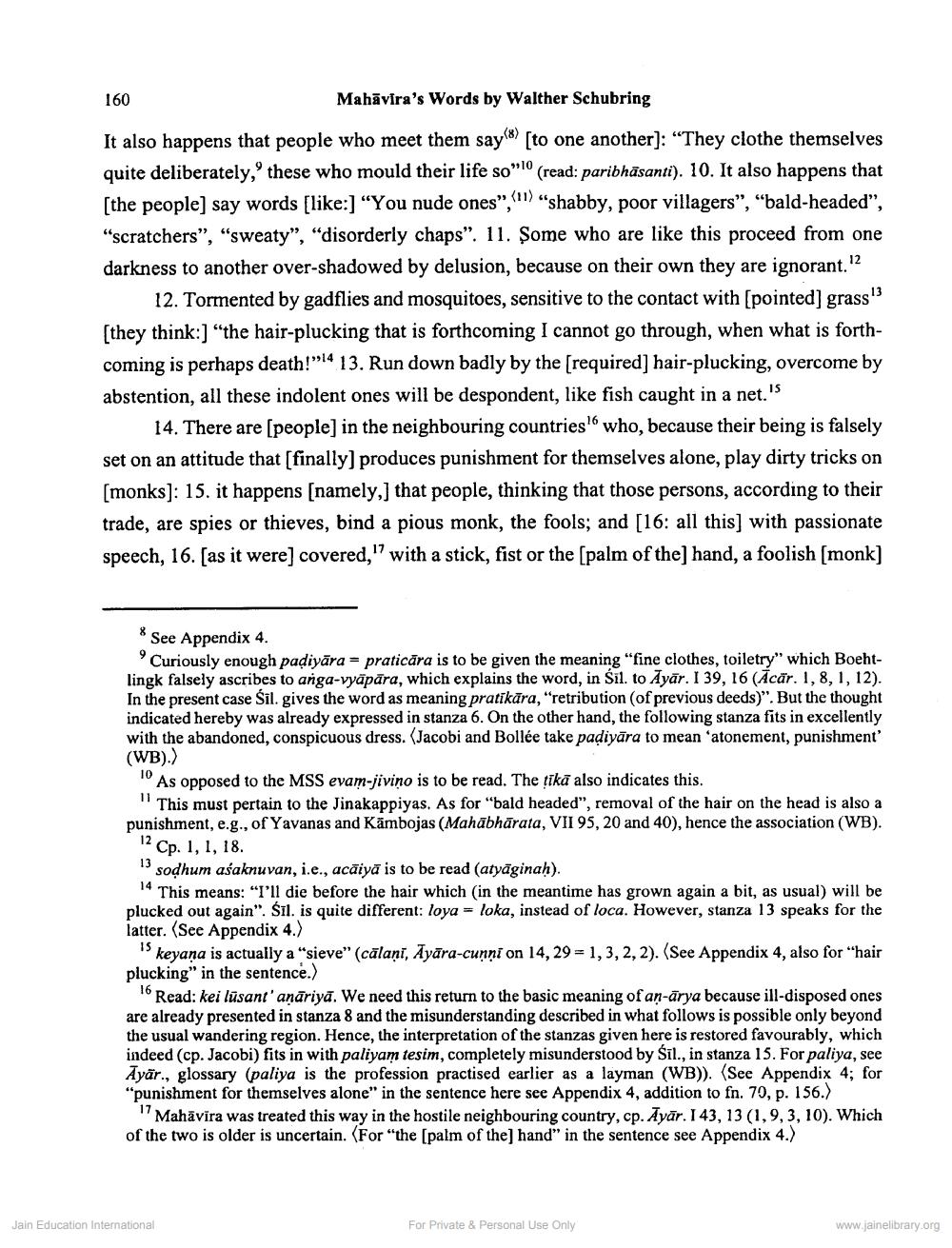________________
Mahavira's Words by Walther Schubring
It also happens that people who meet them say [to one another]: "They clothe themselves quite deliberately, these who mould their life so"10 (read: paribhāsanti). 10. It also happens that [the people] say words [like:] "You nude ones", () "shabby, poor villagers", "bald-headed", "scratchers", "sweaty", "disorderly chaps". 11. Some who are like this proceed from one darkness to another over-shadowed by delusion, because on their own they are ignorant."2
12. Tormented by gadflies and mosquitoes, sensitive to the contact with [pointed] grass13 [they think:] "the hair-plucking that is forthcoming I cannot go through, when what is forthcoming is perhaps death!" 13. Run down badly by the [required] hair-plucking, overcome by abstention, all these indolent ones will be despondent, like fish caught in a net."
14. There are [people] in the neighbouring countries" who, because their being is falsely set on an attitude that [finally] produces punishment for themselves alone, play dirty tricks on [monks]: 15. it happens [namely,] that people, thinking that those persons, according to their trade, are spies or thieves, bind a pious monk, the fools; and [16: all this] with passionate speech, 16. [as it were] covered," with a stick, fist or the [palm of the] hand, a foolish [monk]
160
See Appendix 4.
9
Curiously enough paḍiyāra praticara is to be given the meaning "fine clothes, toiletry" which Boehtlingk falsely ascribes to anga-vyāpāra, which explains the word, in Sil. to Ayar. I 39, 16 (Acar. 1, 8, 1, 12). In the present case Śil. gives the word as meaning pratikara, "retribution (of previous deeds)". But the thought indicated hereby was already expressed in stanza 6. On the other hand, the following stanza fits in excellently with the abandoned, conspicuous dress. (Jacobi and Bollée take paḍiyāra to mean 'atonement, punishment' (WB).)
10 As opposed to the MSS evam-jivino is to be read. The ṭīkā also indicates this.
11 This must pertain to the Jinakappiyas. As for "bald headed", removal of the hair on the head is also a punishment, e.g., of Yavanas and Kambojas (Mahābhārata, VII 95, 20 and 40), hence the association (WB). Cp. 1, 1, 18.
12
13 sodhum aśaknuvan, i.e., acāiyā is to be read (atyāginaḥ).
14 This means: "I'll die before the hair which (in the meantime has grown again a bit, as usual) will be plucked out again". Śil. is quite different: loya = loka, instead of loca. However, stanza 13 speaks for the latter. (See Appendix 4.)
15 keyana is actually a "sieve" (cālaṇī, Āyāra-cunni on 14, 29 = 1, 3, 2, 2). (See Appendix 4, also for "hair plucking" in the sentence.)
16 Read: kei lusant' aṇāriya. We need this return to the basic meaning of an-arya because ill-disposed ones are already presented in stanza 8 and the misunderstanding described in what follows is possible only beyond the usual wandering region. Hence, the interpretation of the stanzas given here is restored favourably, which indeed (cp. Jacobi) fits in with paliyam tesim, completely misunderstood by Sil., in stanza 15. For paliya, see Aydr., glossary (paliya is the profession practised earlier as a layman (WB)). (See Appendix 4; for "punishment for themselves alone" in the sentence here see Appendix 4, addition to fn. 79, p. 156.)
17 Mahavira was treated this way in the hostile neighbouring country, cp. Ayar. I 43, 13 (1,9, 3, 10). Which of the two is older is uncertain. (For "the [palm of the] hand" in the sentence see Appendix 4.)
Jain Education International
For Private & Personal Use Only
www.jainelibrary.org




